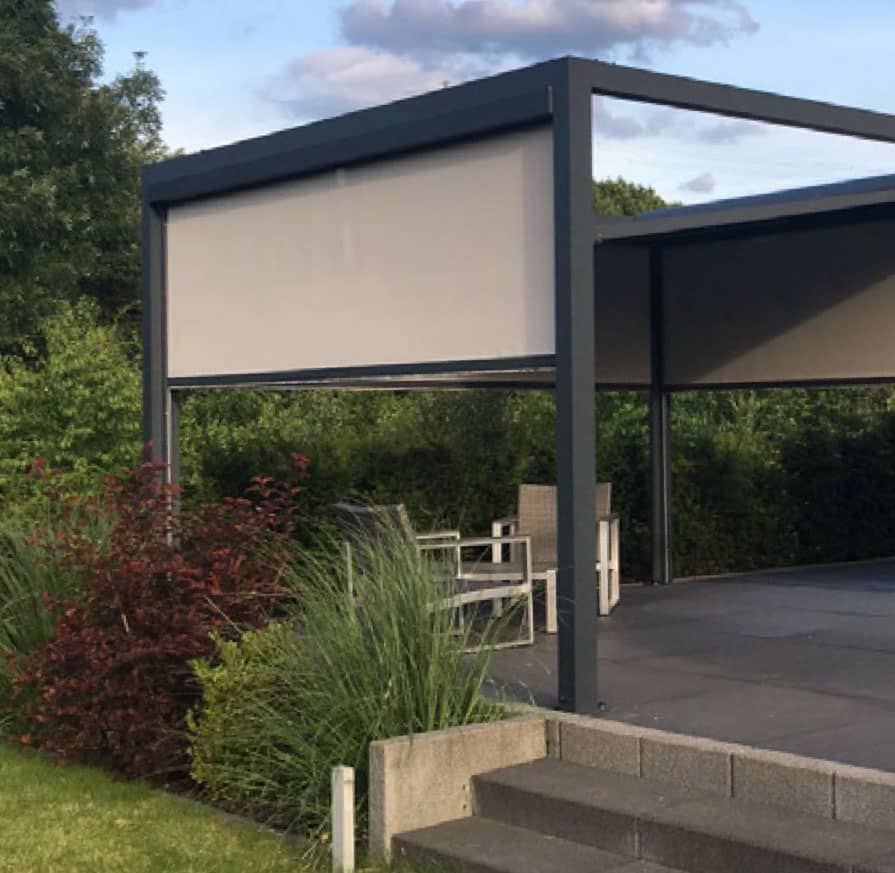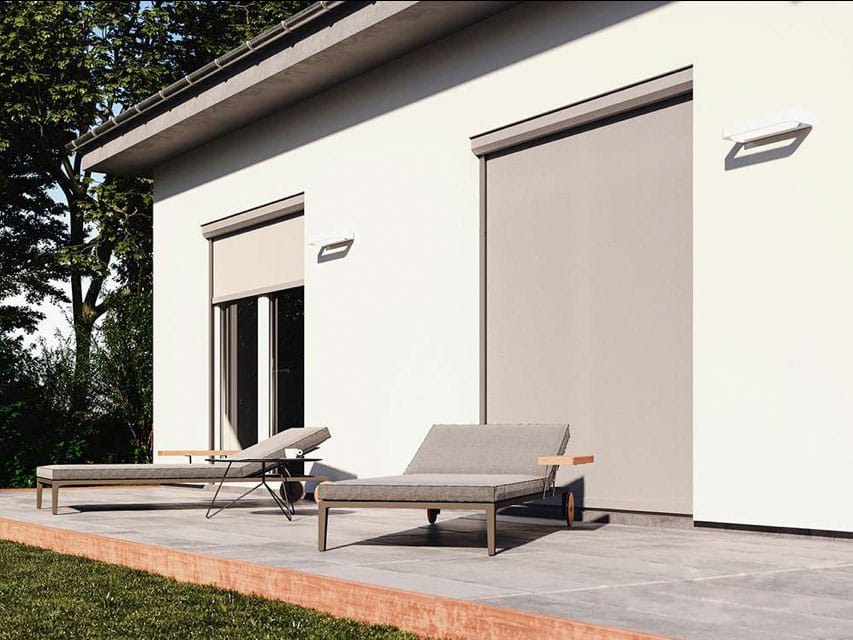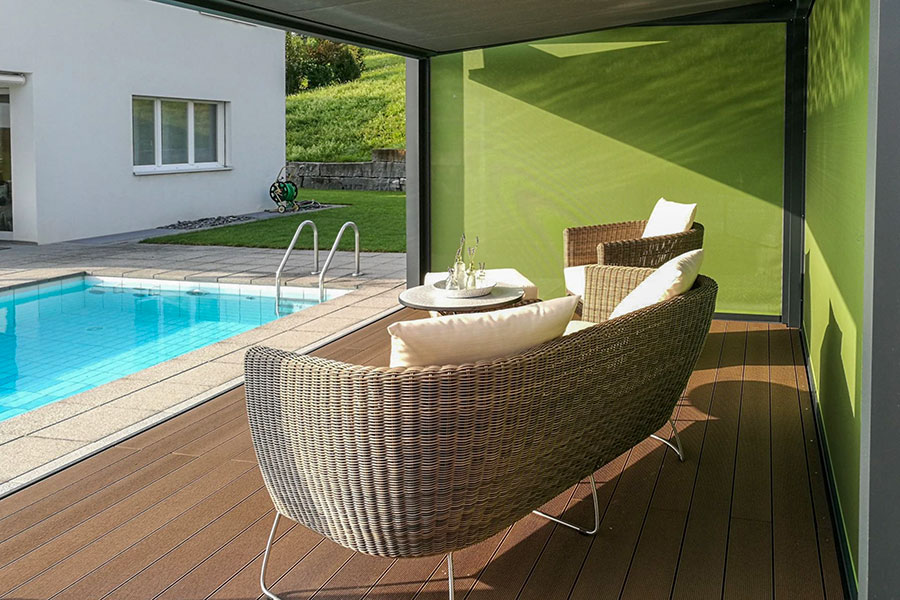Vertical awning
A vertical awning are a type of sun and privacy screens that are attached to the outside of windows or doors. They consist of a rod mounted on the wall and a fabric that can be moved up and down along the rod. When the fabric is lowered, it blocks the sun’s rays and prevents too much light from entering the interior of the building. Vertical awnings are especially suitable for large windows or patio doors, as they can cover a larger area than traditional blinds or shades. They can also be used in combination with other types of solar and privacy screens to provide more flexible control over daylight inside the building. Vertical awnings come in a variety of colors and fabrics, and can be customized to complement the style and color scheme of the building.
Definition of vertical awnings
Vertical awnings are a type of sun and privacy protection that are mounted on the outside of windows or doors. They consist of a rod attached to the wall and a fabric that can be moved up and down along the rod. When the fabric is lowered, it blocks the sun’s rays and prevents too much light from entering the interior of the building. They are particularly suitable for large window areas and patio doors and provide flexible control of daylight in the interior. Vertical awnings come in a variety of colors and fabrics that can be matched to the architecture and color scheme of the building.
Intended use
Vertical awnings are mainly used for sun and privacy protection. They block the sun’s rays and prevent too much light from entering the interior of the building. This lowers the interior temperature and reduces the load on the air conditioning system.
They can also be used to increase indoor privacy by preventing visibility from the outside. They can also help improve the exterior appearance of a building.
Vertical awnings are especially suitable for large window areas and patio doors, as they can cover a larger area than traditional blinds or shades. They can also be used in combination with other types of solar and privacy screens to provide more flexible control over daylight inside the building.



Advantages of vertical awnings
-
Sun and privacy protection: vertical awnings block the sun’s rays and reduce the amount of light entering the interior of the building, cooling the interior and reducing the load on the air conditioning system.
-
Covering large window areas: they are particularly suitable for large window areas and patio doors and provide greater coverage than traditional blinds or shades.
-
Combinability with other types of solar and privacy screens: they can be used in combination with other types of solar and privacy screens to provide more flexible control over daylight inside the building.
-
Adaptability to the style of the building: vertical awnings come in a variety of colors and fabrics, and can be customized to complement the style and color scheme of the building.
-
Increase privacy: they can also be used to increase indoor privacy by preventing visibility from the outside.
-
Improving the exterior appearance: you can also help improve the exterior appearance of a building.
Sun and privacy protection from a vertical awning
A vertical awning provides both sun and privacy protection for your outdoor space. It can be attached to windows or patio doors and allows you to regulate the sunlight and the view from the outside. The vertical orientation of the awning allows you to specifically block the sun’s rays and create a pleasant climate on the terrace or balcony. At the same time, the awning also provides privacy, as it restricts the view from the outside. There are different types of vertical awnings, such as awnings with manual or motorized operation, which can be controlled by remote control. There are also awnings with integrated sun and rain sensors that automatically respond to the weather. A vertical awning is a practical and attractive way to protect your outdoor space from the sun and prying eyes.
Covering large window areas with a vertical awning
A vertical awning is an excellent solution for covering large window areas. It allows you to specifically block the sun’s rays while limiting the view from the outside to create privacy. The vertical orientation of the awning makes it possible to completely cover the window area, creating a pleasant environment even in rooms that would otherwise become unbearably hot.
There are several types of vertical awnings that are suitable depending on the size of the window area and personal preferences. Manual operation awnings require the awning to be opened and closed by hand, while motorized operation awnings can be controlled by remote control. There are also awnings with integrated sun and rain sensors that automatically respond to the weather and open or close the awning accordingly.
A vertical awning is a cost-effective and attractive way to protect large window areas from the sun while creating privacy. It is also an ideal solution for rooms that would otherwise become unbearably hot, allowing these rooms to be used even on sunny days.
Combinability with other types of sun and privacy protection
Vertical awnings are very flexible in terms of their combinability with other types of sun and privacy protection. A common combination is the use of vertical awnings together with blinds or shutters. This allows you to regulate the sun’s rays in different ways, depending on whether you need full sun and privacy protection or only partial protection.
Another option is to combine vertical awnings with outdoor blinds or awnings. This makes it possible to regulate both sun and privacy protection indoors and outdoors, creating a pleasant environment.
Also, the combination with a pergola or awning can be a good solution to create shade and privacy.
It is important to note that the combination of sun and privacy solutions should always be tailored to the individual needs and architecture of the building. A professional consultation can help find the best solution for your needs.
Adaptability to the style of the building through a vertical awning
A vertical awning is very adaptable to the style of the building, as it is available in many different colors, designs and sizes. It can be attached to windows or doors and can be operated either manually or electrically. There are also various control options, such as remote control or app control. In addition, the choice of materials and colors allows you to match the awning to the style of the building. For example, by choosing a natural, neutral color, you can integrate the awning into the appearance of the building.
Functionality
A vertical awning consists of a frame, a fabric cover and an operating system. The frame holds the fabric cover in tension and is attached to the wall or ceiling at the top and to the window or door opening at the bottom. The fabric cover can be opened or closed as needed to block sunlight and view from outside.
Operation of a vertical awning can be manual or electric. In the case of manual operation, the fabric cover is opened and closed with the help of a crank or handle. An electrically operated vertical awning has a motor that controls the opening and closing of the fabric cover. The motor can be controlled either with a remote control or an app.
Some vertical awnings also have additional features such as a sun or wind sensor system that automatically controls the opening and closing of the fabric cover, depending on weather conditions or the position of the sun.
As a rule, vertical awnings are made of sturdy materials and are weather resistant, so they can be used even in the rain and wind.
The operation of a vertical awning depends primarily on the method of operation.
In a motor-driven vertical awning, the awning fabric is rolled up and down by means of a motor. This can be controlled either via a remote control or an app.
A crank-operated vertical awning is rolled up and down manually by means of a crank.
A pulley operated vertical awning is rolled up and down by means of a pulley.
In all cases, the awning cloth protects from sunlight and rain.
Optional features include rain and sunlight sensors that automatically roll the awning fabric in and out, depending on weather conditions.
Visit our exhibition
Metallbau Görres GmbH
Commercial area Zingsheim South 39
53947 Netterheim Zingsheim
Monday to Friday 08:00 – 16:00
Saturday by appointment
Feel free to arrange a personal appointment!
Mounting on the outside of windows or doors
Mounting a vertical awning on the outside of windows or doors is usually done by attaching the awning head to the wall or window frame using screws or dowels.
The awning head contains the awning cloth and the operating mechanism, it is usually mounted near the window or door.
The awning fabric is then guided forward from the rear of the awning head and clamped in the guide rails.
Depending on the model and manufacturer, mounting may vary slightly, so it is best to follow the manufacturer’s instructions.
It is recommended to have the installation done by a professional to ensure that the awning is properly and securely fastened.
Selection options
When choosing a vertical awning, there are a few options to consider:
-
Size: vertical awnings come in different sizes, so you can choose the awning to fit the size of the window or door.
-
Material: Vertical awnings are available in different materials, such as acrylic, polyester or sunscreen fabric.
-
Color and pattern: vertical awnings come in many colors and patterns, so you can match the awning to the facade or interior of the building.
-
Operation: vertical awnings are available with different methods of operation, such as motor, crank or pulley.
-
Sensors: Some vertical awnings have rain and sunlight sensors that automatically roll the awning in and out, depending on weather conditions.
-
Accessories: there are also accessories that can be purchased for the vertical awning, such as side panel, which increase the protection from sunlight and rain.
It is important to choose according to your own needs and desires, as well as to follow the manufacturer’s instructions to ensure the safety and durability of the awning.
Conclusion:
Vertical awnings are a practical and elegant solution to protect windows and doors from sunlight and rain. They are available in different sizes, materials, colors and patterns, so you can match the awning to the facade or interior of the building. There are different methods of operation such as motor, crank or pulley and also the option to install rain and sunlight sensors. It is recommended to have the installation done by a professional and to follow the manufacturer’s instructions to ensure the safety and durability of the awning. Overall, vertical awnings are a great choice for anyone looking for an effective and attractive way to protect their windows and doors.
A. Vertical awnings are a practical and attractive solution for sun and privacy protection
B. They provide flexible control over the daylight inside the building
C. There are many choices to match the awnings to the style of the building.
